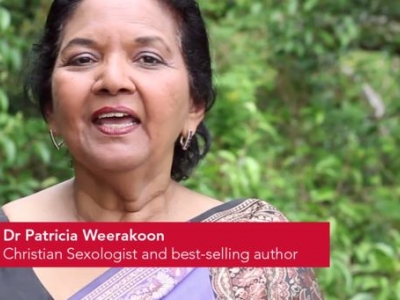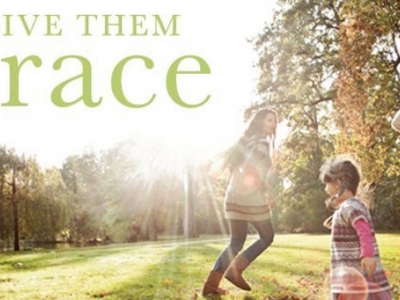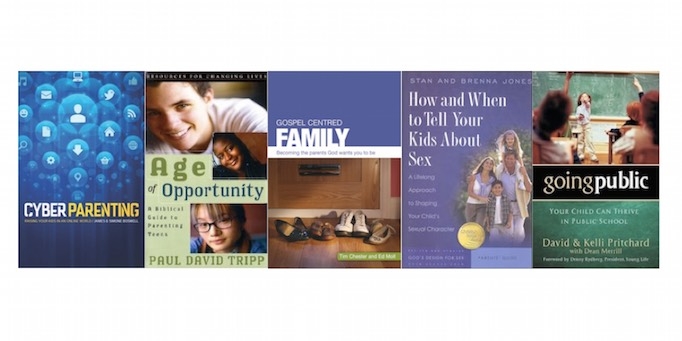
My top five Christian parenting books
And how they can help with issues including sex, online safety, grace, schooling and leading kids to Christ.
Christian parenting books ... wow! What a minefield. The shelves of any Christian bookstore are groaning under the weight of what is on offer. Which makes me wonder...
- How do I choose?
- Will I agree with the author?
- Will it make me feel even more guilty as a parent?
- Can I really have a new child next week, set enough boundaries and love in the right language, as they suggest?
I don’t read parenting books to find answers, rules and ‘you musts’. I don’t think it’s possible that any one author has everything right nor do I think there is only one right way to parent.
Why then do I read parenting books? Because they keep me thinking, they give me ideas and suggestions and make me evaluate what patterns we have subconsciously fallen into.
I know my children better than anyone, I know their areas of sinfulness and I certainly know my own! But sometimes I can’t see clearly anymore. A fresh idea can help. Also, everything changes so quickly with parenting. At one moment you are avidly reading tips about sleep, eating and toilet training, then before you know it you are thinking about chores, money, online issues and sexuality.
Before we start...
So, following are five books I have found helpful. But before I get to them, I must start with a few caveats:
- The Bible should be Number 1. God’s word charts our course in the big picture principles of parenting, calling us to love our kids with grace and forgiveness, and to take responsibility for teaching them the faith. I have assumed we all agree with that, and so have chosen to recommend 5 additional books.
- I have not read all there is to read. So it’s highly likely I haven’t read your favourite parenting book. There are at least new five books on my bookshelf waiting to be read. It’s possible they could then become my favourites. Anyone’s list is highly subjective and just a suggestion!
- I have selected the following books for a reason. I've purposely chosen 5 books that cover different topics or categories, and most of them are the ones I have found helpful in recent years. Our children are aged 12, 10 & 7, so these books represent the topics most relevant to our stage.
So, here we go – my (current) favourite Christian parenting books...
1. Gospel-Centred Family: Becoming the Parents God Wants you to be
(Ed Moll and Tim Chester, The Good Book Company, 2010) 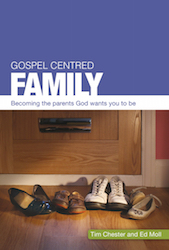
This is not your standard parenting book that talks about how to raise well-rounded & well-behaved children. Rather it takes us further and challenges us to think about how being Christian changes our parenting, our goals for our children and our priorities as a family.
They encourage us to think about how the gospel shapes our parenting; more than wanting our children to be being well-rounded, successful and competent, we should desire for our children to know God and serve him.
They address the need for discipline – but emphasise that parents need it as much as children do. At the same time, they strongly assert that we need grace as well. Grace for parents allowing us to trust God in all things and let go of the guilt that we feel as parents. And grace for children so that they know they are always loved and accepted by us (& God), no matter what they do, just like has God loved and accepted us through Jesus.
They remind us to enjoy our kids - making sure we consider them a gift, a helpful reminder not to get so caught up in ‘parenting’ and ‘the busyness of life’ that we forget to actually enjoy them.
It encouraged me to consider how we make God’s Word central in our family life: “don’t underestimate the power of the word lived and the word loved” (p64). Finally, there was a whole section on being a family that is mission-centred; to be a family that serves and loves others, both those who are local and those who are far away.
Even with all of that, it’s a small, short book. Each chapter is only about 5 pages, has a bible passage to think about, some pointers about how the bible instructs us on that matter and then some practical suggestions for how to do it. It’s a great starting point for thinking about how your family is going with keeping the gospel and God’s word at the centre.
2. Cyber Parenting: Raising your kids in an online world
(James & Simone Boswell, Growing Faith, 2013) 
This helpful, practical and biblical book gives parents of today’s children a great resource. The most grounding part of this book is the reminder that as parents today we are facing nothing new. Although some technology is new for our generation, the issues they raise are as old as time: the same issues of the heart that people have faced for thousands of years – be they wisdom, self-control, where we find our value and what we make our idols. I found this incredibly reassuring, for at times I can feel a bit panicky about parenting children in our online world.
Broken into four parts they address the basics of technology, then the basics of parenting in training our children to know God and then desire godliness and character. They then move to address the four main areas of the online world: social networking, cyber bullying, gaming and pornography. This was full of wisdom and practical suggestions, and is essential reading for parents of children who are already online or soon to be. The final section deals with the practicalities of managing your networks, security, passwords and parenting controls.
A Washington Post article recently suggested our generation, “had the last of the truly-low tech childhoods and now are among the first of the truly high-tech parents”. This book will help you navigate this high-tech world with your online kids, with a clear and helpful biblical framework.
3. How and When to Tell your Kids about Sex
(Stan and Brenna Jones, Nav Press, 2007) 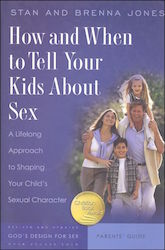
We are keen to be open and honest with our kids about sex, and address issues factually without either squeamishness or fanfare. Yet I realized some time ago that I wasn’t entirely sure how to do this once the conversation turned to more specific questions. This was a great resource in helping think through such things, with sample conversations and ideas for age-appropriate information.
Stan and Brenna Jones deal with 4 stages: infancy to kindergarten, pre-puberty, puberty and adolescence. Over all of these stages, they have developed 12 principles of sex-education which can be applied. These include:
- Parents are the principal sex educators
- First messages are the most potent
- We should seize teachable moments and become askable parents
- Stories are powerful teaching tools
- Positive messages are more powerful than negative messages
- We must inoculate our children against destructive moral messages
- Sexuality is not the most important thing in life
I finished reading this book with much more confidence about how to address topics and seize teachable moments. Alongside the books the Joneses have released as part of their series for children (including What’s the Big Deal? and Facing the Facts), and Patricia Weerakoon’s new Growing Up by the Book, there are now a number of very good resources for children and parents about both puberty and sex education from a biblical perspective.
4. Going Public: Your Child Can Thrive in Public School
(David & Kelli Pritchard, Regal, 2008) 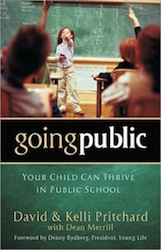
If talking about parenting books opens up a whole can of worms, talking about education choices can blow the can out of the water!
While this book is billed as a resource to help and encourage you to use the public school system for your children’s education, it is much more than that.
It is really a book about parenting your children through the school years. Most of it is relevant no matter what education system you decide on - public, private, Christian and (to a lesser extent) homeschool.
Their overarching message is that God is in control, even over our children’s education. Their second main point is that as parents we are in control. Wherever our children are educated, we are still their main educators. We are the ones who spend the most time with them and who have the most influence over their lives.
I found this book incredibly helpful. It made me think afresh about parenting during the school years and about my time and my involvement in our children’s education. As the Pritchards say:
“What matters… is the fact that you serve an incredibly mighty God, and He will prevail. Trust Him on this journey. Walk from school year to school year in confidence that He is on your side.” (p209)
5. Age of Opportunity
(Paul David Tripp, P&R, 2001) 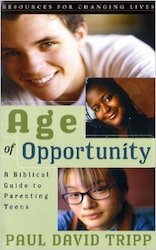
I have only recently read this book and it has shot straight to the top of my favourites list.
Tripp confronts the main issue many of us face in parenting – what is going on in our hearts. At every stage, but definitely with teenagers, parents must stop and think, where is my heart in this? What idols am I trying to hang on to: perhaps comfort, respect, appreciation, control or success? Or am I truly trying to lead my children closer to God and his sustaining grace?
Tripp starts with the family and how it is supposed to function and then identifies some of the key issues in the teen years parents need to be aware of such as having no hunger for correction or wisdom, a tendency to legalism and unwise companions, and a lack of heart awareness.
Then he works towards five goals we should have:
- To focus on the spiritual struggle – teaching and showing our kids that an eternal perspective is what matters.
- To develop a heart of conviction and wisdom. Here we try to teach them to develop a biblical mind and to be able to determine the difference between a conviction (where there is an absolute right and wrong) and wisdom (how to analyse and assess a situation and the potential ways to respond)
- To teach them to understand and interact redemptively with culture. We neither hide from the world we live in, nor accept all of it, rather we teach them how to think about the culture we are surrounded by: wisely, alertly and redemptively.
- To develop a heart for God. In the end this is the ultimate goal of our parenting, to help our kids develop their own relationship with God, and a desire to live for him.
- To prepare them to leave home. We want to help them develop the signs of maturity they will need as Christian adults.
His final chapter was 20 (!) small steps to work towards making these goals happen. This is a great summary chapter of how to behave as a parent, while working towards these larger foundational goals. Things like: always talk lovingly and constructively (sound obvious, but hard in reality), stay calm, be honest about your own struggles, be willing to overlook the minor things and humbly admit your limits.
Tripp calls parents to a very high standard, but one that is absolutely worth it. I have no problem being called to a high standard for it is also surrounded with honesty, grace and forgiveness. Tripp makes the astute point that most families plan their holidays in much more detail than their parenting. We should be planning, we should be preparing and we should be praying for our parenting and our children.
That’s my current top five. Growing Faith readers it’s now over to you – please share your favourite parenting books!
A more detailed review of each of these books can be found via the parenting page on Wendy’s blog.
For more articles from Growing Faith, subscribe to our monthly e-newsletter.
To hear about the latest books and resources from Youthworks Media, subscribe here.



